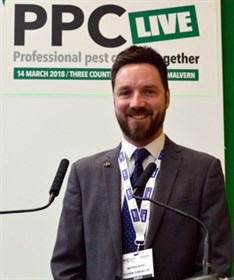It might only be its third outing but, as weve come to expect, PPC Live again had a strong seminar programme. We didnt get to all the sessions but heres a run-down of the ones we got chance to listen to.
Action v Impacts – a pest controller’s quandary
In essence this presentation from Gary Williams, Urban Wildlife epitomised the need for pest controllers to undertake thorough environmental assessments before commencing a treatment, any treatment
.and not just to satisfy the CRRU Code of Practice. Gary explored a number of scenarios – from cluster flies to bird control, from fox control to rabbit and rat control; where pest controllers need to think carefully about the potential unintended consequences of their treatments.
As the reader might expect, bats featured heavily in the presentation and certainly every pest controller should now be thinking ‘bats’ every time they are asked to enter a roof space. But do rat and rabbit controllers think of slow worms, grass snakes and newts every time they set a spring trap in a burrow?
Whilst the Wildlife and Countryside Act 1981 was the most likely vehicle for prosecution and penalty (fines in some cases may be unlimited), the Criminal Finances Act 2017 may be applied in serious cases. Penalties may be determined by the profits of the organisation found guilty of the offence.
|
|
|
|
Options for mosquito management in the UK
Dr Matthew Davies from Killgerm Chemicals reminded us of the two recent discoveries of Asian Tiger mosquitoes – regarded as the most invasive mosquito species in the world – in the UK in the last two years.
The Tiger mosquito (Aedes albopictus) could very easily gain a foothold in the UK, it is already common in many parts of Europe. Transmission has been, and is likely to be again, via the export/import trade in used tyres. It is the eggs/larvae and pupae that thrive in the small amount of rainwater trapped in the tyre rims. We may imagine that our temperate climate will protect us, however the eggs are both frost tolerant and resistant to desiccation.
Outlining the role of Mosquito Watch, Matt emphasised that there was no room for complacency. The UK already harbours quite a few species of both biting and non-biting mosquitoes, we don’t want the Asian Tiger to get established here.
Matt went on to discuss control emphasising the importance of the removal of even small collections of standing water, such as wheelbarrows, water butts, blocked gutters and even cemetery vases. With the current absence of Bti (Bacillus thuringiensis israelensis) products approved for mosquito control, physical methods are vital.
Technology v Technicians – how everybody wins (except the rats)
Like it or not technology continues to spread in all walks of life and all aspects of business. It is a force that could be good or it could be bad but it cannot be ignored. Better to embrace the possibilities. So said Savvas Othon from Rentokil Initial.
Savvas put forward an analysis of a typical technician’s day. In this he estimated that 75% of the technician’s time was spent travelling, checking devices and writing up reports. Only 25% of the time was spent interacting with the customer and actually ‘managing pests’. It was Savvas’s view that technology could be cheaply and effectively utilised to automate the humdrum activities freeing up the technician to spend more of his/her time being the ‘professional’ that the customer wants.
He emphasised that pest management was NOT checking boxes and should not be perceived to be so. The technician should not be spending time checking them when technology can provide that information and complete the report. Transport to and from site may seem an inevitable cost on time but we are at the threshold of the age of driverless vehicles. Instead of ‘driving’, the technician could spend time reviewing what is happening on site.
Other examples put forward included using virtual reality both in training (out of season pests for example) and for technicians to learn the site layout before arrival. He also raised the possibility of using ‘recognition’ software to identify some of the less obvious pests.
From a personal point of view, the writer of this article attended a similarly titled seminar three years ago. In that short time possibilities have crystallised and, what seemed then science fiction is rapidly turning into accessible fact!
|
|
|
Apprenticeships almost with us
There has never been a formal apprenticeship for professional pest management in the UK but in a matter of a few weeks, at most, there will be a fully fledged and funded apprenticeship scheme up and running. It’s another big step forward in the march to professionalise our sector and we have the British Pest Control Association to thank for taking the lead on this. The new apprenticeships will be open to anyone – youngsters leaving school or older folks looking to re-train and learn new skills. What’s more whilst BPCA has played a leading role in developing the scheme, you don’t need to be a member of BPCA to benefit from it.
Fourteen companies including large and small organisations were involved in the Apprenticeship Task Force but as is usually the case it has been a few key individuals who have given their time to turn the idea into reality. Martin Rose-King from Bounty Pest Control who has chaired the Employer Development Group thanked David Cross (Rentokil) David Lodge (Beaver) Andy Gray (Ecolab) and Lewis Jenkins (Check) for their efforts.
Thanks should also go to Martin who is clearly passionate about this project. He was even prepared to stand-up in public to talk about it – something he confided he would really rather not have to do. Martin also thanked his co-presenter BPCA’s training development manager, Karen Dawes who went on to outline the content of the apprenticeship, which will last a minimum of 12 months and has a strong practical content. The scheme will be launched as soon as the group has final government clearance for the proposed assessment standard. This is expected to arrive any day, so watch this space.
Resistance draws them in
Whilst the show generally quietened off in the afternoon, plenty of people stayed on for the final session of the day: Resistance – back to basics, from Clive Boase of the Pest Management Consultancy.
Clive explained how resistance can quickly build-up. Mutations occur naturally during the formation of egg and sperm cells. Most of these go unnoticed but some can be beneficial allowing a few individuals to survive chemical treatment. These individuals go on to breed, passing on the resistant genes to their offspring. Continued applications of the same chemical or group of chemicals favours the resistant individuals and soon the majority of the population will be resistant. It is an entirely natural process and is actually just evolution in action.
He went on to look at what can be done to control resistant populations and how to prevent the development of resistance in the first place such as alternating between chemicals with different modes of action. We will be reviewing his presentation in more depth in the next issue of Pest magazine.




 Dr Matthew Davies
Dr Matthew Davies Savvas Othon
Savvas Othon 